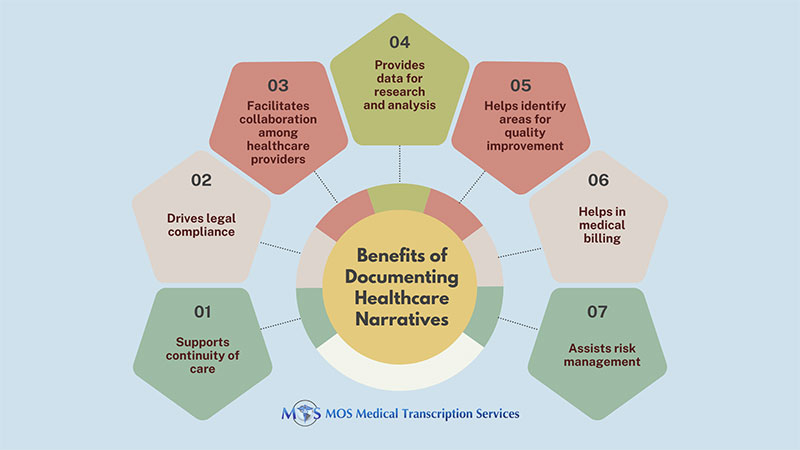
Table of Contents
|
“It is much more important to know what kind of patient has the disease than what sort of disease the person has,” Osler instructed his trainees at the turn of the twentieth century.” ― Lisa Sanders, Every Patient Tells a Story: Medical Mysteries and the Art of Diagnosis |
We all love to listen to stories. The reason why stories are so powerful is because they help our brains connect information with feelings. They can make us learn, entertain us, warn us, or even inspire change. In healthcare, stories can support healing. Patient narratives guide diagnosis and treatment, while physician stories foster understanding and hope. This approach is termed “narrative-based medicine”. It recognizes that illness isn’t just a collection of symptoms but a unique experience shaped by individual contexts, beliefs, and emotions. Using narratives can educate and engage patients and caregivers, and improve patient care. Medical transcription services play a crucial role in documenting these narratives.
What are Healthcare Narratives and Why do They Matter?
The term “narrative medicine” was coined and defined by Rita Charon in the early 2000s as “medicine practiced with narrative skills or recognizing, absorbing, interpreting, and being moved by stories of illness. It presents storytelling in medicine as a means to bring back the communication stream often lost between physician and patient.
Instead of simply noting their symptoms and prescribing medication, this approach encourages healthcare providers to listen attentively to their patients and understand their stories. Patients are encouraged and guided to share stories of their life and treatment through conversations and personal written notes. By putting their experiences into words, patients can better understand their illness, which can help them cope with their diagnosis and treatment.
Integrating these narratives into clinical decision-making can enhance care. For instance, when treating a patient for persistent headaches, delving into their narrative could reveal a broader understanding of their condition. The physician can learn whether factors like stress due to work deadlines, personal life challenges, family history of migraines, or recent dietary changes play a role in causing their migraines.
Physicians can use storytelling as a tool to educate, engage, and empower patients and caregivers. By sharing a helpful and informative story of a heart patient, a cardiologist can educate the patient on the importance of lifestyle changes and medication adherence. The story can empower the patient to make positive changes in their life.
Quality healthcare depends on the strong communication bridge between patients and physicians. Using narratives is one way to improve that communication. Active listening and understanding of the patient’s story improves rapport and strengthens the doctor-patient relationship.
By understanding the association between the physical, emotional, and mental aspects of health, physicians can tailor treatment plans that align with a patient’s beliefs and circumstances, driving better adherence to treatment and improved outcomes. Writing, sharing, and discussing personal narratives can be therapeutic for both patients and healthcare providers.
Benefits of Recording Healthcare Narratives
Documenting narratives ensures a full picture of a patient’s health journey, allowing for better-informed decision-making and personalized care plans. It supports the following:
- Continuity of Care: It helps in maintaining a consistent record, aiding different healthcare providers involved in a patient’s care to understand their history, treatments, and progress.
- Legal and Ethical Reasons: Accurate documentation is essential for legal purposes, ensuring that care is well-documented and follows ethical guidelines.
- Research and Analysis: Healthcare narratives provide valuable data for research, trends analysis, and improvements in healthcare delivery.
- Communication and Collaboration: Shared documentation facilitates communication among healthcare teams, fostering collaboration and coordination for optimal patient care.
- Quality Improvement: Analyzing documented narratives helps healthcare systems identify areas for improvement, refine protocols, and enhance overall quality of care.
Accurate documentation is also essential for insurance claims and billing, ensuring proper reimbursement and transparency in healthcare transactions. Detailed records can support risk management by providing insights into potential issues, complications, or patterns that might affect patient outcomes.
Medical Transcription: Ensure Accurate Documentation of Healthcare Narratives

Role of Medical Transcription
By converting spoken words of physicians, nurses, and specialists into written records, medical transcriptionists support the use of healthcare narratives in patient care. These records include patient histories, examination findings, diagnoses, treatments, and follow-up care plans. Accuracy in medical transcription is vital, as these records serve as a vital part of a patient’s medical history and can significantly impact their ongoing care.
Documenting physician-patient narratives involves more than just transcribing words. It requires capturing the nuances, emotions, and context conveyed by the healthcare provider and the patient. This needs a deep understanding of medical terminology, sensitivity to the patient’s situation, and the ability to accurately represent the patient’s narrative in written form. A medical transcription company that has skilled transcriptionists can ensure accurate medical records that reflect the complete story of the patient’s healthcare journey, supporting continuity of care and treatment decisions.


